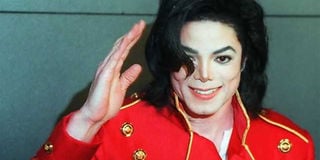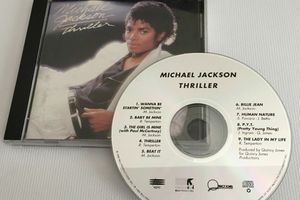
In this file photo taken on March 19, 1996 US pop star Michael Jackson waves to photographers during a press conference in Paris.
It seems inconceivable that it has been 15 years since Michael Jackson died because the King of Pop defines the immortality of an iconic artist. His legacy is such that his songs are still so dominant on radio stations around the world and on multiple playlists on streaming platforms. MJ’s style, from the Fedora hat to the rhinestone-covered glove and the white socks, have their place in global cultural folklore.
The influence of Michael Jackson, who died on June 25, 2009 at the age of 50, has spread to a demographic born 20 years after the release of his bestselling 1982 album “Thriller”. A new generation of fans are engaging with Michael’s songs by creating and sharing their own content on social media inspired by his music and his signature dance moves like the moonwalk. “I wanted videos that stand out with quality, excellence, perfection,” said Michael in a recoding from his personal archive heard for the first time in the film “Thriller 40”. The documentary released in 2023 to mark the 40th anniversary of his masterpiece album features demo recordings from Michael’s home studio in California of classics like “Billie Jean”. The filmmakers also had access to notes and tapes from Michael’s archives: “I never give up until I get what I want,” he scribbled in a note to himself. During the recording of “Thriller”, he is heard muttering, “biggest selling album of all time.”
“If Thriller came out today, it would still be the greatest album ever made,” says American rapper, singer and producer Will I Am in the film. “It is the ultimate blueprint to modern pop music.” The budget for the “Thriller” video was $1.2 million at a time when the average amount spent on creating one music video was $50, 000. Acclaimed Hollywood filmmaker John Landis was recruited to direct the short film, whose elements such as the zombie dance and Michael’s red jacket have left a lasting impression on global pop culture.
After the video was released, the sales of the album tripled, at one point registering 1 million copies a week. Jackson swept the Grammy Awards in 1984 winning a record 12 Grammys with producer Quincy Jones, including Album of the Year and Record of the Year. To date, sales of the album are estimated at a conservative 70 million copies worldwide. MJ was obsessive about his performances as revealed in “This Is It” the documentary released in 2009 which offers behind-the-scenes glimpses of his rehearsal for the tour that was cancelled after his death. He pushed his band to “let it sizzle” and “make the music simmer” because he wanted the audience to hear the songs exactly as they would on the recordings.
The recently released “The Greatest Night in Pop” about the making of the charity single “We Are the World” in 1985 is chance to experience the genius of the workings of Michael Jackson. Amid all the confusion among the host of superstars who turned up for the recording, a calm MJ delivers his vocal parts with aplomb unflustered by frequent retakes, caused by Cyndi Lauper’s rattling bracelets leaking on the microphone.
His co-songwriter Lionel Richie humorously describes his anxious moments while working on the song at Michael’s home surrounded by talking birds, his pet chimpanzee Bubbles and a hissing python, a reminder of the singer’s quirky lifestyle. His Neverland ranch was home to an assortment of animals including giraffes, alligators, a bear, three elephants, four tigers, monkeys, snakes and lizards.
“I handled Michael in two ways,” says legendary cartoonist Paul Kelemba “Maddo”. “In my work as a cartoonist, he laid himself open to some degree of ridicule due to his weird nature, his physical transformation and skewed personal life. But as one who appreciates music, I found him a genius, a oner, a once in a lifetime occurrence of extraordinary and sheer talent that created a worldwide subculture.”
Michael and his brothers started music in their parents’ two-bedroomed house in Gary, Indiana rehearsing under the watchful eye of his father Joe Jackson. The Jackson 5 signed with Motown Records in 1968 with Michael who was just 9 years old as lead singer. Motown was a company started in 1959 in the U.S city of Detroit by Berry Gordy, a 30-year-old former featherweight boxer turned music mogul. The name of the company was adopted from the reputation of Detroit as “Motor City”, home to General Motors, Ford and Chrysler, America’s largest motor vehicle companies.
The label provided a home for African American musicians at a time when the music industry mirrored the segregation in the rest of American society. The success of Motown Records came down to factory-like efficiency as the recording studios remained open close to 24 hours a day. The Jackson 5 joined a roster that included stars like Diana Ross and The Supremes, The Four Tops, Stevie Wonder, Marvin Gaye and The Temptations.
Motown’s influence spread beyond the shores of America to Europe and eventually Africa where a young population in the 60s and 70s lapped up the trademark catchy rhythms and identified with the African American stars. “There was very little, if any, soul music on radio when I joined the Voice of Kenya in February 1975,” recalls broadcaster Abdul “Big Q” Haq. “I started playing the soul records of James Brown and the Motown sound of the Jackson 5. The song that I really loved was “I’ll Be There” with Michael’s baby voice. Like it or not the Jacksons were Michael,” declares Haq.
Soul music
Haq had been exposed to soul music as a high school student in Mombasa when he and a group of friends formed a band called Semi Lunatics (later Blue Boys), the forerunner of Mombasa Roots and Safari Sound Band. They used to visit popular entertainment venues of the time like the Sunshine Night Club where the resident bands welcomed the young musicians to perform on stage. “We always played two songs: “The Popcorn” by James Brown and “I’ll Be There by the Jackson 5,” recalls Haq. “So, when I joined radio, Monica Kabeberi who was Head of Audio Library at Broadcasting House would look at my playlist and ask “where did you get all this music from” and I would say “I grew up with this music.”.”
His colleague and on-air rival on the General Service radio (now called The English Service), George Opiyo, loved playing another Motown giant Gladys Knight, while Haq preferred the Jackson 5, Marvin Gaye and James Brown. “Playing “I’ll Be There” on the Late Date show brought people together and even though that was an era before mobile phones, the telephone switchboard would be jammed anytime listeners heard Michael Jackson, Stevie Wonder or Marvin Gaye.”
Michael released four solo albums between 1972 and 1975 and became a huge global star with his 1979 album “Off the Wall” his first project with Quincy Jones, an extraordinarily successful partnership that would continue on “Thriller” (1982) and “Bad” (1987). There was greater scrutiny of Michael’s personal life from the speculation about his skin pigmentation to reported extensive surgeries to alter his forehead, cheekbone and lips.
“We used to think that he was superhuman, like “He-Man Masters of the Universe” that we watched on TV. We hoped that he would come to Kenya but our parents told us stories of how he travels with his own oxygen. I think Maddo the cartoonist even drew a cartoon,” recalls Wakaba. (That cartoon was a caricature of Michael’s non-performing African tour in 1992 which turned out to be a public relations disaster due to antics like clutching his nose and covering his face in public. He visited Gabon, Ivory Coast and Tanzania, but skipped Kenya and Egypt that were on the original itinerary).
Shame and scandal
The 1990s brought more musical success with “Dangerous” the bestselling album worldwide in 1992 and “HIStory: Past Present and Future” in 1995 but there was more personal turmoil with a short-lived marriage to Lisa Marie Presley, daughter of Elvis Presley. His trial on charges of child molestation in 2005 ended in an acquittal but the sight of Michael Jackson shuffling to court in his pyjamas was a sad illustration of how a widely adored megastar had fallen spectacularly in shame and scandal. His death came just as he was preparing to play 50 dates in London that would have earned him enough money to offset the numerous debts he faced. That tour was never to be.
A host of top musicians will on June 29 stage a concert in honor of Michael Jackson, 15 years after his death, at the Braeburn Theatre, Nairobi. The Michael Jackson Tribute is a live concert curated by singer, actress and broadcaster June Gachui with lead vocalists Manasseh Shalom, Rikki Gatabaki and Sam Warui and choreography by Art In Motion. The show will honor Michael’s ground breaking music, iconic stage performance through his timeless songs including “Billie Jean”, “Thriller”, “Beat It”, “Smooth Criminal” and “Man in the Mirror”. “Our band and vocalists will bring these classics to life, delivering performances that capture the essence of Michael Jackson’s genius,” says Gachui.
Songwriting, to Michael, was a spiritual experience. “Leave it in the hands of God, it is the work of God,” he says during the recording of “Billie Jean”. “MJ is different, he was one of a kind. If you put on his music and close your eyes, the music sinks to a deep place,” says Haq.







